The newsletter of the SDC Agriculture & Food Systems Network provides you with the latest news submitted by the network members four times a year: projects, publications, events, network activities - everything to do with food systems. Feel free to subscribe by clicking the button on the right (network members are automatically subscribed).
Latest issue: Septemer 2023

Feature |
Member Articles |
News |
Events |
Who is who |
Comic
Editorial
Dear Reader,
It is my pleasure to share with you the 3rd edition of this year’s Agriculture & Food Systems Newsletter. Coming back from the summer break we are happy to update you on the most recent developments of our network.
We are also happy to remind you of the first post-COVID-19 in-person Face-to-Face-Meeting which awaits us in Rome this September (26th-28th) and will build on the findings of the Food Systems Learning Journey. The keynote speeches will be streamed online. You will be informed about online participation, and the outcomes will be published on the AFS Shareweb.
But going back to this fall-edition of the AFS-newsletter, we are happy to share with you the following interesting readings specifically targeting agriculture and climate change:
- We start off with our feature piece on compost production in Rwanda. Have a look at the recently published article on how Rwanda is successfully addressing dysfunctional municipal waste management systems.
- Next up we have an update from the on-going NICE-project in Bangladesh which specifically is targeting gender and youth.
- In the next article, Chloé Rismann is introducing us to how agriculture entrepreneurship in Niger can provide opportunities specifically for women and youth.
- Read more about how sustainable agriculture opportunities can be unlocked in Ethiopia or how the Cambodian government is committed to combating climate change and accelerating the transition to a climate-resilient, low-carbon, sustainable mode of development.
- There is also an interesting publication on future-proof food systems in the magazine “One World” as well as an update from Wetlands International on improving food security and nutrition in the Sahel.
- Learn more about the agroecological transition as a practitioner from the recently published learning tool of Sufosec Alliance and stay connected with their upcoming phase 3 of the agroecological learning journey.
Last but not least have a look and sign-up to the World Food Forum which is coming up this October and zooms in on the topic of climate change this year. Finally, we are happy to introduce you to our colleague Eustache Ndokabilya Dunia from DRC.
At this point we want to thank everyone, who submitted a contribution to this newsletter and we hope you enjoy the read!
All the best,
Lara
 Lara Sponagel
Lara Sponagel
Academic trainee, Section Food Systems, SDC
LinkedIn | lara.sponagel@eda.admin.ch
Feature
The challenging reality of compost production in Rwanda
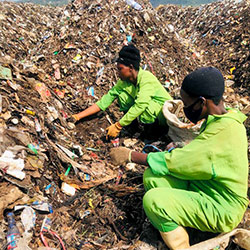 Today, most African countries have a dysfunctional municipal waste management system, negatively impacting the environment and human health. However, as most of this waste is recyclable, informal actors are making their income out of the collection/sorting of waste. Accounting for the risks involved in waste manipulation, it is important to ensure decent working conditions for those recycling it. This study focuses on biowaste recycling in Rwanda, a Circular Economy leader in Africa, with the purpose of:
Today, most African countries have a dysfunctional municipal waste management system, negatively impacting the environment and human health. However, as most of this waste is recyclable, informal actors are making their income out of the collection/sorting of waste. Accounting for the risks involved in waste manipulation, it is important to ensure decent working conditions for those recycling it. This study focuses on biowaste recycling in Rwanda, a Circular Economy leader in Africa, with the purpose of:
(i) characterizing the working conditions of waste recyclers along the definition of ‘decent work’ and
(ii) assessing workers’ satisfaction and its determinants. Further research should investigate how to push forward waste sorting at the household level and improve worker safety (SDG 8) without negatively affecting the women currently employed in waste sorting at the company level (SDG 5).

Mélanie Surchat
Independent Agricultural Consultant
LinkedIn |
melanie.surchat@usys.ethz.ch
Read the full article
Members Articles
Improving household diets and family income in Bangladesh
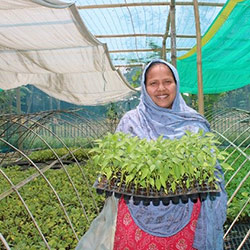 In Rangpur city, Bangladesh, the Nutrition in City Ecosystems (NICE) project is working to transform urban food systems by strengthening governance of local structures, increasing the development of nutrition-sensitive value chains, and facilitating the involvement of women and youth as entrepreneurs along the supply chain. Read more about Luna Akhter’s and Omar Faruk’s journeys and watch the video.
In Rangpur city, Bangladesh, the Nutrition in City Ecosystems (NICE) project is working to transform urban food systems by strengthening governance of local structures, increasing the development of nutrition-sensitive value chains, and facilitating the involvement of women and youth as entrepreneurs along the supply chain. Read more about Luna Akhter’s and Omar Faruk’s journeys and watch the video.
 Helen Prytherch
Helen Prytherch
Swiss Tropical and Public Health Institute
LinkedIn |
helen.prytherch@unibas.ch
Read the full article
Cultiver un avenir durable grâce à l’Entrepreneuriat local au Niger
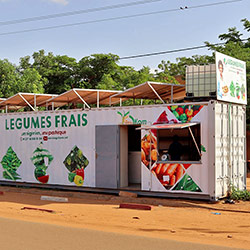 Dans les régions de Dosso et Maradi au Niger, une initiative novatrice prend forme avec le Programme de Promotion de l’Entrepreneuriat Local (PROMEL). Axé sur l’agriculture durable et les chaînes de valeur agricoles, PROMEL redéfinit les opportunités pour les jeunes et les femmes tout en promouvant un avenir économique pérenne. Découvrez comment cette initiative s’attaque aux enjeux de l’emploi, de l’autonomisation et de la sécurité alimentaire tout en embrassant les principes d’une agriculture respectueuse de l’environnement.
Dans les régions de Dosso et Maradi au Niger, une initiative novatrice prend forme avec le Programme de Promotion de l’Entrepreneuriat Local (PROMEL). Axé sur l’agriculture durable et les chaînes de valeur agricoles, PROMEL redéfinit les opportunités pour les jeunes et les femmes tout en promouvant un avenir économique pérenne. Découvrez comment cette initiative s’attaque aux enjeux de l’emploi, de l’autonomisation et de la sécurité alimentaire tout en embrassant les principes d’une agriculture respectueuse de l’environnement.
 Chloé Rismann
Chloé Rismann
Swisscontact
LinkedIn |
chloe.rismann@swisscontact.org
Lire l'article complet
À la fin de l'année 2021, la Fondation Swisscontact a été chargée par la Direction du développement et de la coopération Suisse de mettre en œuvre le Programme de Promotion de l'Entrepreneuriat Local (PROMEL) dans les régions de Dosso et Maradi au Niger. Sous la supervision du ministère de l'Industrie et de l'Entrepreneuriat des Jeunes, PROMEL se profile comme un catalyseur majeur destiné à stimuler la création d'emplois et à autonomiser les femmes et les jeunes au Niger. Son objectif premier réside dans la promotion de l'entrepreneuriat local au sein des chaînes de valeur agricoles à fort potentiel, avec pour résultat concomitant la génération d'emplois et de revenus décents pour les femmes (âgées de 18 ans et plus) ainsi que les jeunes hommes (âgés de 18 à 35 ans), tout en contribuant à la sécurité alimentaire et nutritionnelle des ménages.
Le programme s'appuie sur quatre axes stratégiques fondamentaux : le développement de systèmes de marché inclusifs autour des chaînes de valeur agricoles porteuses ; le soutien à l'émergence de services entrepreneuriaux adaptés aux acteurs du secteur agricole ; la promotion de l'inclusion financière pour les bénéficiaires soutenus ; et enfin, la transformation des secteurs ciblés en harmonie avec les politiques publiques. En ciblant les secteurs du lait, de la pomme de terre, du maraîchage et de l'arachide, PROMEL adopte une approche axée sur le développement des systèmes de marché, cherchant ainsi à établir des partenariats solides avec des entreprises agricoles désireuses de mettre en place ou de renforcer un modèle d'affaires inclusif avec de jeunes agriculteurs et éleveurs. Cette démarche vise à améliorer les revenus, à créer des emplois décents et à fournir des opportunités aux jeunes femmes et hommes impliqués.
Dans le cadre de la mise en œuvre de PROMEL, en début d'année 2022, Swisscontact a identifié le Réseau des Producteurs de Pomme de Terre de Doutchi (RPPT), opérant dans le secteur du stockage et de la vente de pommes de terre. Ayant manifesté un intérêt pour un modèle d'affaires incluant davantage les jeunes producteurs de pommes de terre, le RPPT a exprimé sa volonté de co-investir en partenariat avec PROMEL. Cette collaboration fructueuse a notamment permis d'assurer un approvisionnement régulier en pommes de terre (cultivées de manière biologique) en quantité suffisante auprès des groupements de jeunes producteurs de la région de Dosso.
Un porte-parole du RPPT explique : « Nos premières tentatives de production de pommes de terre n'ont pas été fameuses. L'utilisation d'engrais chimiques a conduit à des pertes de plus de 40 %. De plus, il était presque impossible de conserver la récolte sur le long terme, alors que notre modèle d'affaires se fonde sur le stockage en vue de la revente lors de périodes de hausse des prix sur le marché. Pour résoudre ce problème, nous avons opté pour une production exclusivement basée sur du compost organique, sans produits chimiques. Les résultats ont été très positifs : seulement 5 % de pertes, avec une durée de conservation de plus de 4 mois. De plus, nos produits sont très appréciés sur le marché en raison de leur qualité supérieure. Désormais, les pommes de terre du RPPT possèdent leur propre identité, telle une "appellation d'origine contrôlée". »
En effet, PROMEL a grandement contribué à l'expansion du modèle d'affaires du RPPT en fusionnant des considérations de compétitivité avec des principes d'agriculture durable. Grâce à ce partenariat, le RPPT a pu intégrer des centaines de jeunes femmes et hommes dans une activité rentable de production de pommes de terre sans produits chimiques. Le réseau sélectionne les jeunes producteurs après une visite de leurs champs et leur fournit du compost ainsi qu'un crédit-semences par le biais du service financier MEC ARK. À travers PROMEL, plus de 65 000 000 F CFA (soit 94 709 CHF) de crédits ont été facilités, sans nécessité de garantie. Les capacités des jeunes producteurs sont renforcées en ce qui concerne les techniques de production à base de compost, grâce à un suivi, un soutien et des conseils dispensés par des techniciens mis à disposition par Swisscontact (avec une stratégie de transfert progressif de cette responsabilité au RPPT). Les récoltes des jeunes producteurs sont ensuite rachetées et stockées dans les entrepôts du RPPT, dont la capacité a été accrue de 500 tonnes grâce à PROMEL.
En termes de résultats, après un peu plus d'un an d'intervention, PROMEL commence déjà à prouver son efficacité. Grâce à cette première collaboration, le RPPT a intégré 380 nouveaux jeunes producteurs âgés de 18 à 35 ans, bénéficiant de semences de pommes de terre à crédit. Cela a entraîné une augmentation significative de la production, passant de 460 tonnes à 967 tonnes. Les membres ont généré un chiffre d'affaires de 256 925 000 F CFA (soit 374 357 CHF).
Un membre du RPPT exprime : « Nous n'aurions jamais imaginé jouer un rôle aussi crucial dans notre communauté en impliquant les jeunes dans l'économie locale et en créant des marchés stables et rentables pour eux. »
L'objectif à la fin de la phase actuelle du programme, fin 2025, est de fournir des opportunités à plus de 1 000 jeunes producteurs âgés de 18 à 35 ans (dont 40 % de femmes). Cette démarche devrait permettre d'augmenter la production à 2 000 tonnes, avec un chiffre d'affaires annuel cumulé atteignant 1 000 000 000 F CFA (soit 1 457 067 CHF).
Site web du projet
Unlocking Sustainable Agriculture Opportunities in Ethiopia
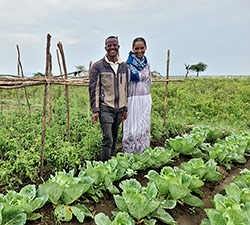 In 2022, Caritas Switzerland commissioned and engaged in two studies to uncover business opportunities combating climate change realities within the region. Learn more about the "Analysis of Linking the Food System in the Ziway-Shalla Basin to the Market in Addis Ababa", which delved into the basin's business potential and consumer reception in Addis Ababa.
In 2022, Caritas Switzerland commissioned and engaged in two studies to uncover business opportunities combating climate change realities within the region. Learn more about the "Analysis of Linking the Food System in the Ziway-Shalla Basin to the Market in Addis Ababa", which delved into the basin's business potential and consumer reception in Addis Ababa.
 Maciej Chmielewski
Maciej Chmielewski
Caritas Switzerland
LinkedIn |
mchmielewski@caritas.ch
Read the full article
Nestled within Ethiopia's captivating landscapes, the Ziway-Shalla basin hosts interconnected lakes – Ziway, Langano, Abijatta, and Shalla – forming a thriving biodiversity hotspot. This closed lake basin provides essential ecosystem services and livelihoods to over two million people engaged in agriculture, fisheries, floriculture, and tourism. Despite its potential, the basin faces challenges that demand innovative solutions for sustainable development.
In 2022, Caritas Switzerland commissioned and engaged in two studies to uncover business opportunities combating climate change realities within the region. The study "Analysis of Linking the Food System in the Ziway-Shalla Basin to the Market in Addis Ababa", delved into the basin's business potential and consumer reception in Addis Ababa. Here are the study's key messages:
-
Understanding the Perception of Organic Farming: Ethiopian consumers' evolving perception of organic farming offers a catalyst for change. As the country’s economy further opens to international markets the shifts in consumer perceptions and needs in Ethiopia provides an avenue for local farmers in the Ziway-Shalla basin to tap into an evolving market of conscientious consumers who are interested in ‘healthy food’ and modified diets. In the study we dedicated a large portion of our inquiry to investigate middle class consumer’s perceptions regarding organic produce and their willingness to purchase such products. Notably, Ethiopian consumers' interpretation of organic differs from established standards in places such as Switzerland: organic in Ethiopia is strictly linked to homegrown products, or even as far as to say ‘national’ products, yet consumer opinions on pesticides and conventional fertilizers are largely fragmented between urban and rural populations and in some cases unknown. To further succeed in this line of work, our strategies for producing and connecting consumers with agroecologically produced commodities must account for very price-conscious attitudes, the small but growing organic inputs sector, and the government’s food export aspirations.
-
Synergy of Food Security and Agroecology: Food security and agroecology are interconnected routes to resilience. Focusing on the promotion of food security alongside implementing agroecological practices nurtures the land and sustains local livelihoods. These parallel pathways reinforce each other, fostering robust ecosystems, diverse agriculture, farmer well-being as well as more sustainable consumption patterns. Recognizing this synergy empowers both the land and its caretakers.
-
Unveiling Untapped Business Prospects: The tranquil Ziway-Shalla basin conceals untapped business opportunities. With its strategic location and diverse ecosystems, the basin offers fertile ground for innovative enterprises. From eco-tourism leveraging biodiversity, agribusinesses harnessing organic farming potential, to the nearby Agro-Industrial Park under development increasing access to processing infrastructure and technology and hence to increased local level value addition, the opportunities are limitless. Unleashing these potentials not only drives green economic growth but also has a potential to also harmonize progress with environmental preservation and foster social cohesion and inclusiveness. The basin's natural beauty provides the backdrop for ventures aligned with sustainability, empowerment, and prosperity.
The Ziway-Shalla basin exemplifies both the positive strides in Ethiopia's agricultural development and its concurrent ecological challenges. The basin has already witnessed significant ecological trauma due to factors like the large-scale flower industry along its shores, the use of diesel generators by small-scale farmers for irrigation, excessive reliance on conventional inputs such as fertilizers and pesticides, and the community's lack of foresight regarding the basin's long-term sustainability. It's imperative to explore and formulate business models that benefit the resident community in its entirety, the basin ecology, the private sector, and consumers alike. The study by Caritas Switzerland marks the beginning of this journey for which it will be essential that landscape-based actors and the more distant consumers and other supporting actors jointly embrace, adapt, and expand upon these findings to enhance both local and national food systems in Ethiopia.
As the sun sets over its waters, challenges fade against the horizon of innovation, collaboration, and transformation. Caritas Switzerland's collaborative efforts, alongside international partners, embody sustainable development's commitment. By leveraging local potential, embracing inclusivity, and redefining market access, this initiative paves a brighter, sustainable future for the basin's people, land, and vibrant waters.
Read the full study
Empowering Farmers: A Rewarding Journey Towards Agroecology
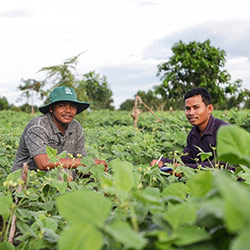
The Royal Government of Cambodia (RGC) is committed to combating climate change and accelerating the transition to a climate-resilient, low-carbon, sustainable mode of development. The Dei Meas initiative is currently making significant progress toward incentivizing smallholder farmers to transition toward agroecological practices and contribute to the efforts of the RGC, but ongoing efforts are needed to promote agroecological practices further.
 Bipaswi Dhar Tuladhar
Bipaswi Dhar Tuladhar
Swisscontact Cambodia
LinkedIn |
bipaswi.tuladhar@swisscontact.org
 Pritesh Chalise
Pritesh Chalise
Swisscontact Cambodia
LinkedIn |
pritesh.chalise@swisscontact.org
 Pierre-Antoine Vernet
Pierre-Antoine Vernet
Swisscontact Cambodia
LinkedIn |
pierre-antoine.vernet@swisscontact.org
Read the full article
Cambodia is on a Path to Carbon Neutrality
As the global population grows and consumption patterns change, food production is estimated to increase by 30% by 2030 and 50% by 2050. Climate change is also expected to impact crop yields in the long term. Therefore, increasing natural resource use efficiency is crucial for sustainable food production and environmental protection. This requires innovative and climate-resilient agricultural production systems and technologies that promote yield growth while protecting ecosystems.
The Royal Government of Cambodia (RGC) is committed to combating climate change and accelerating the transition to a climate-resilient, low-carbon sustainable mode of development. The RGC has supported global efforts against climate change by being a Party to the United Nations Framework Convention on Climate Change (UNFCCC) since 1996. Cambodia adopted and ratified the Paris Agreement by which the country submitted an ambitious Intended Nationally Determined Contribution (NDC), which showcased the country’s progress in climate policy and put forward mitigation targets and adaptation actions consistent with the national circumstances. Furthermore, Cambodia has also modelled a credible scenario for carbon neutrality by 2050 and has put forth a Long-Term Strategy for Carbon Neutrality (LTS4CN) that presents a policy scenario to realize a vision of a carbon-neutral and resilient society within the next 30 years. However, to realize these visions, there is an urgent need for the agriculture sector to move from conventional agricultural practices to agroecology.
Agroecology practices have shown immense potential in restoring degraded lands, optimizing nutrient availability, and combating climate change. They also positively impact food security, food sovereignty and farmers' livelihoods. Despite the benefits, smallholder farmers face several uncertainties when adopting these practices.
The Dei Meas (Golden Soil in Khmer Language) pilot project aims to test replicable and institutionalized business models that incentivize farmers to transition sustainably toward agroecological practices. The initiative is based on three pillars:
- a practice-based reward system, providing incentives to smallholder farmers to access and implement agroecological practices,
- a precise and cost effective MRV (Monitoring, Reporting, and Verification) system that tests different innovative technologies to quantify soil carbon sequestration (SOC), greenhouse gas emissions reduction, and the impacts on soil biodiversity as well as other co-benefits and,
- a financial mechanism for credit access and market establishment.
In early 2022, Dei Meas, in partnership with other initiatives (Metkasekor, WAT4CAM project), held a series of demand-creation events designed to introduce three agricultural scenarios to local farmers. These scenarios encompassed i) the use of cover crops (single or mixed species) before or after the cash crop cycle for soil improvement or seed production, ii) the implementation of appropriate scale machinery with the use of the land leveller and No-Till Planter (NTP), and iii) diversification of the cropping system with one pulse crop cycle integrated (Mung bean, cowpea). In total, five demand creation events were conducted to promote the Dei Meas pilot program in Battambang. Three events were held in the villages of Kanghot irrigated perimeter, while the remaining two were conducted in the upland regions of Rattanak Mondoul district. As a result of these events, a total of 81 smallholder farmers from the lowlands and 26 farmers from the uplands registered for the pilot program.
The selection of these farmers was based on predetermined criteria that included prior implementation of sustainable practices, active participation in demand-creation events or training sessions, and ownership of plots within the selected villages in the uplands and inside the irrigated perimeter.
383 plots (352 hectares) underwent the first steps of transition towards agroecology. The Battambang Provincial Department of Agriculture, Forestry, and Fisheries (PDAFF) organized a series of rewarding events for smallholder farmers in partnership with the Department of Agricultural Land Resources Management (DALRM/GDA), Conservation Agriculture Research for Development Centre (CARDEC) and Battambang Union of Agricultural Cooperatives (BUAC) to incentivize farmers to transition towards agroecology and raise awareness about the PDAFF's and CARDEC/DALRM’s role and support in this transition. 107 farmers from Uplands and Lowlands of Battambang were awarded USD$ 3,718 and USD$7,958, respectively according to the scenario implemented.
Conducting additional events in the intervention areas are being carried out to help register more farmers and reach the project's goal of transitioning 500 hectares of land under agroecological practices. Additionally, an agro-economic assessment of the smallholder farmers' transition is being conducted to provide valuable insights into the livelihood and environmental impacts of their transition. Finally, the calibration of the several technologies of the MRV system for soil organic carbon and soil ecosystem services measurements is in progress to ensure accurate measurements. Once the calibration of these tools and systems is completed to suit the Cambodian context, the project will be poised to engage with eco-credits, carbon removal credits, carbon avoidance credits, impact bonds, and explore blended finance models. This signifies substantial prospects for expansion both at the national scale and within the broader regional sphere.
Overall, the Dei Meas initiative represents an ongoing step toward promoting agroecological practices and can create positive impacts for smallholder farmers and the environment.
Within the framework of the project "Agroecology and Safe Food System Transitions in South-East Asia and Fonds français pour l'environnement mondial" (ASSET/FFEM), the Department of Agricultural Land Resources Management (DALRM) is leading a pilot initiative, called Dei Meas (golden soil), supported by SmartAgro, CIRAD, and Swisscontact. Dei Meas is further supported and co-financed by Swisscontact’s Innovation for Sustainable Agriculture (ISA) project funded among others by Swiss Agency for Development and Cooperation (SDC) and Lien Foundation.
Further resources:
https://press.un.org/en/2009/gaef3242.doc.htm
https://metkasekor.com/
https://wat4cam-mowram.com/en/about-us/wat4cam
News
Future-Proof Food Systems
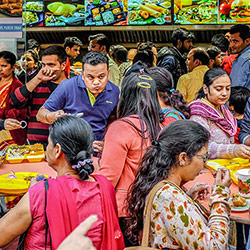
The world population has reached eight billion people. Experts agree that food for all can only be ensured in the long term if the system undergoes transformation. This, they say, is the only way to protect the food system from the consequences of wars, pandemics or climate change. Read more about how to address food systems in a world of eight billion people in an article recently published in the SDC magazine “One World”.
Read more
Samanta Siegfried
One World – The SDC Magazine for Development and Cooperation
LinkedIn |
kontakt@samanta-siegfried.ch
Success in Improving Food Security and Nutrition in the Sahel
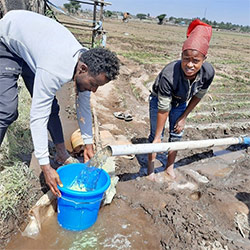
The program "Improving food security and nutrition in the Sahel by safeguarding Wetlands through Ecological Sustainable Agricultural Water management (SaWeL)" has been making significant strides in ensuring food security and nutrition for communities living around the lakes Wegnia & Sourou (Mali) and Ziway-Shalla (Ethiopia). The program focused on two key objectives: improving the integrated management of natural resources and agriculture and supporting market and value chain development. Remarkable results have been achieved by implementing good practices in integrated and sustainable water and land management, enhancing access to quality inputs, and fostering competitive markets.).
Read more
 Nupur Jain
Nupur Jain
Wetlands International
LinkedIn |
nupur.jain@wetlands.org
Critical success factors in the early stages of the agroecological transition
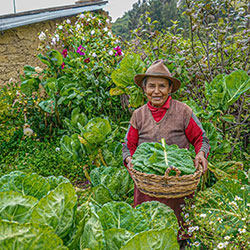
How to shape the first, critical steps towards the agroecological transition as a practitioner? This question has been central to an online workshop series with 180 participants from over 20 countries, organised by the Learning Group on Agroecology of the Sufosec Alliance. The resulting learning document is now available.
Read more
 Sandra Fuerst
Sandra Fuerst
Learning Group on Agroecology by the Sufosec Alliance
LinkedIn |Sandra.Fuerst@skat.ch
Events
Agrifood systems transformation accelerates climate action
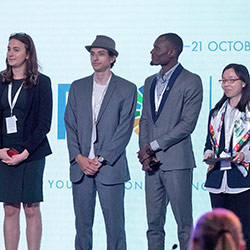 Rome, Italy | 16-20 October 2023
Rome, Italy | 16-20 October 2023
In 2023 the World Food Forum (WFF) - a youth-led movement and network to transform our agrifood systems - is committed to the theme: “Agrifood systems transformation accelerates climate action.
Learn more Register here
How do we foster an enabling environment for the agroecological transition?
 Online | Spanish: 3 October 2023, 15-17 CEST, English: 17 October 2023, 9-11h CEST, French: 24 October 2023, 13-15h CEST
Online | Spanish: 3 October 2023, 15-17 CEST, English: 17 October 2023, 9-11h CEST, French: 24 October 2023, 13-15h CEST
Theses participatory workshops,
organized by Sufosec Alliance, will discuss the mechanisms and approaches that favour sustainable food system changes at policy and market system levels for a successful implementation of agroecological practices. The series is part of the Agroecology Days, hosted by Agroecology Works.
regístrese aquí register here s'inscrire ici
Who is who
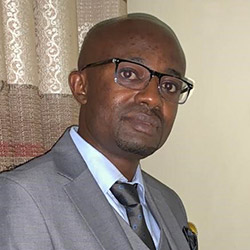
What do you love, or what is special, about your work?
I am passionate about research in order to use it to find solutions to structural challenges. My work at the SDC combines this passion with the response to the people most in need. I like to contribute to alleviating the suffering of children with malnutrition problems. This implies substantive work to push leaders and policy makers to develop nutrition-sensitive and nutrition-specific strategies and policies. The political dialogue in which I am engaged with other donors is moving in this direction. This policy dialogue is based on work and experiences on the ground in order to adopt sectoral policies and strategies.
What is your favourite quote and why?
“Leave No-one Behind, LNOB”. The transformative promise at the heart of the 2030 Agenda for Sustainable Development (2030 Agenda) and related Sustainable Development Goals is to leave no one behind. This quote embodies the commitment made in my current role at the SDC to improve equal access to basic social services, including health and nutrition. This puts an end to discrimination and exclusion and reduces inequalities and vulnerabilities that produce those left behind. Leaving no one behind means not only helping the poorest of the poor, but also addressing the growing discrimination and inequalities that are developing within and between communities and addressing the root causes of such discrimination and inequality. Thus, thousands of malnourished children and women have access to the best prevention and health and nutritional care services.
What is the most important lesson you have learned from your work?
From my experience of fifteen years in the management of health programs, I can say that verticalized approaches do not contribute to the best impact of interventions. It is important to invest and commit to a multisectoral vision to be able to address nutrition issues in fragile states." This implies strong leadership and a policy of good governance at all levels. I deduce from this that health and food systems become efficient and resilient through coordinated, coherent, effective and sustainable financing mechanisms including multisectoral approaches. This allows me to objectify the characteristics of multisectoral approaches in order to increase the performance of health and food systems in a context of fragility. Thus, the eight years spent at the SDC have allowed me to contribute to the political choice regarding alternative financing mechanisms that are sustainable and meet the nutritional and health needs of the population. This requires a space for free and fair dialogue and mutually complementary efforts.
Eustache Ndokabilya Dunia-MPH works as a NPO in Health-Nutrition in the Democratic Republic of Congo (DRC). Since April 2015, Eustache has been working for the Swiss Cooperation SDC in the DRC as a Health-Nutrition and Gender Program Manager. He has a diploma in Epidemiology. He obtained his Master's degree in Public Health and an Interuniversity Certificate in the field of research for the strengthening of health systems at the Université Libre de Bruxelles in 2018. Eustache is a member of the SUN donor network as well as of the Inter Donor Health Group and Vice-Country Coordinator of the Inter Donor Nutrition Group, GIBNUT in the DRC. Currently he is pursuing his doctoral studies (PhD) in Public Health.
Comic

